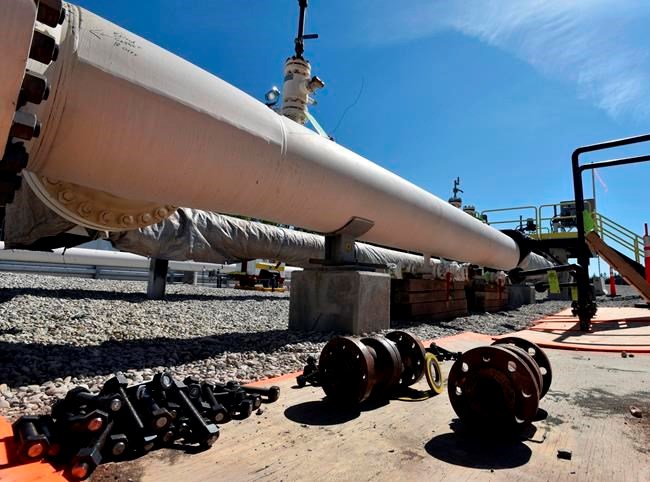WASHINGTON — The Canadian architect of the controversial Line 5 cross-border pipeline expansion project said Friday it remains committed to a negotiated solution to its impasse with the state of Michigan, even though the government has effectively walked away from the table.
Both sides are obliged by court order to engage in a good-faith effort to resolve the dispute, and Enbridge Inc. "remains ready to do just that," the Calgary-based pipeline giant said in a statement.
"Our goal from the beginning has been to work co-operatively to reconcile interests, resolve disputes and move forward in the best interest of people throughout the region," the company said.
"We believe in the process and participated in mediation in good faith. We are committed to continuing to seek resolution, whether through mediation or by asserting our rights in the courts if necessary."
Line 5 ferries upwards of 540,000 barrels per day of crude oil and natural gas liquids across the Canada-U.S. border and the Great Lakes by way of a twin line that runs along the lake bed beneath the ecologically sensitive Straits of Mackinac, which connect Lake Michigan and Lake Huron.
Proponents call it a vital and indispensible source of energy — particularly propane — for several midwestern states, including Michigan, Ohio and Pennsylvania, and a key source of feedstock for critical refineries on the northern side of the border, including those that supply jet fuel to some of Canada's busiest airports.
Critics, however, among them Michigan Gov. Gretchen Whitmer, want the line shut down, arguing it's only a matter of time before an anchor strike or technical failure triggers a catastrophic environmental disaster in one of the area's most important watersheds.
That's why last November, Whitmer abruptly revoked the easement that had allowed the pipeline to operate since 1953, giving the company until May to voluntarily cease operations and triggering a court case that has only dragged on since then.
Enbridge has insisted from the outset that it has no plans to voluntarily shut down the pipeline.
"We understand the stakes in this matter are important not only for Enbridge and the state, but for many others on both sides of the U.S.-Canada border who have a strong interest in its outcome," the company said.
"Meanwhile, we will continue to safely and responsibly deliver the energy the region relies upon from the Line 5 system."
A court-sanctioned voluntary mediation process, which began in April, has failed to yield any agreement and appears to have fallen apart, although the official status of those talks is difficult to divine.
Following the last meeting Sept. 9, Michigan's emissaries "unambiguously communicated to the mediator that any further continuation of the mediation process would be unproductive for them, and they have no 'desire to continue with the mediation process,'" court documents show.
Michigan District Court Judge Janet Neff, however, appears reluctant to call a halt to the process.
"Voluntary facilitative mediation necessarily requires voluntary participation by both parties," Neff said in a decision last week that dismissed as moot one of the state's motions aimed at short-circuiting the talks.
The process, Neff wrote, "is at least at a standstill, although the parties remain under a continuing obligation to engage in good faith to resolve this case."
Where that leaves matters is unclear. The attorney general's office in Michigan refused to comment Friday, referring media inquiries back to the court documents.
Enbridge has also pointed to a possible "diplomatic solution" under a 1977 U.S.-Canada treaty covering cross-border pipelines, which the Canadian government has argued applies in this case and obliges the court to step aside in favour of a negotiated bilateral settlement.
Environmental groups, meanwhile, have been unequivocal in their opposition to the pipeline and a potential replacement project.
Cathy Collentine, associate director of the Sierra Club's "Beyond Dirty Fuels" campaign, said the U.S. Army Corps of Engineers is in the process of an environmental impact assessment on the Line 5 project. It would then be up to the White House to decide whether to take action based on the findings, she said.
If President Joe Biden's administration is serious about confronting climate change, the most contentious cross-border pipeline projects of the last 15 years — Keystone XL, Line 5 and also Line 3, another Enbridge upgrade, this one in Minnesota — are the ones they should be blocking, Collentine said.
Such projects, with their capacity to increase fossil fuel production and consumption, are already affecting communities on the front lines of climate change, she said.
"Those are the exact projects that we have long said we cannot continue to build, we cannot continue to approve," Collentine said.
"It's a moment where the Biden administration, through these analyses, we believe should and hopefully will see that that is also true and not allow these projects to move forward or to continue operating."
This report by The Canadian Press was first published Oct. 1, 2021.
James McCarten, The Canadian Press



